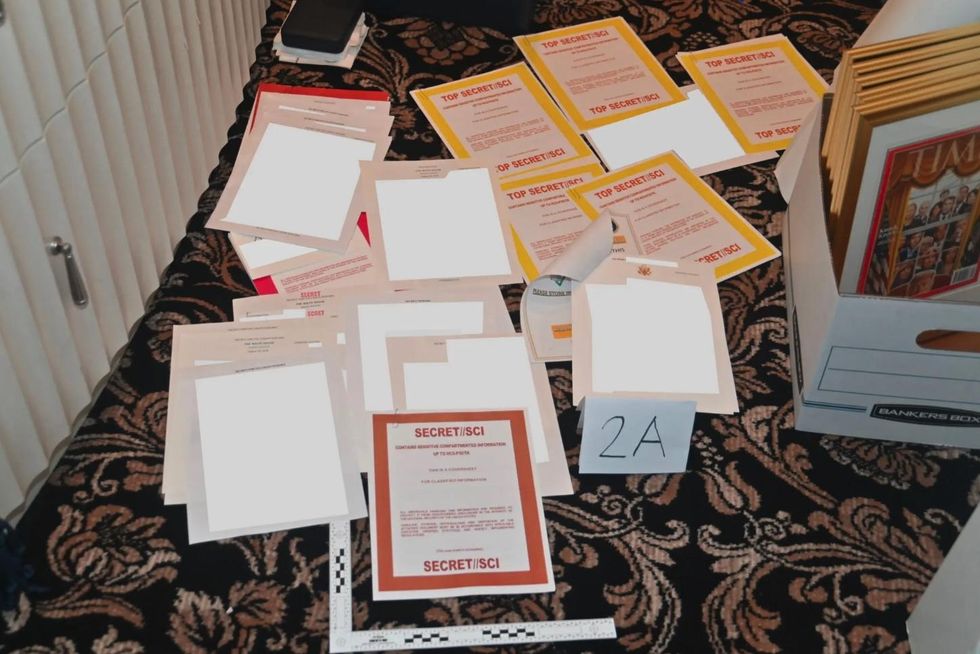
SAUL LOEB/AFP via Getty Images

Mark Levin suggested Wednesday that FBI agents who raided Mar-a-Lago may also have violated the Espionage Act, the same federal law that former President Donald Trump is accused of possibly violating.
The search warrant used to raid Mar-a-Lago last month revealed that Trump is under investigation for possible violations of the Espionage Act.
Most likely, investigators are probing potential violation of the controversial law over Trump allegedly retaining highly classified documents at Mar-a-Lago, documents that could imperil national security in the wrong hands.
Government attorneys included in a Justice Department court filing this week a picture of classified documents strewn on the floor of Trump's Mar-a-Lago office.

The problem is that it's not exactly clear where the documents came from.
Were they discovered strewn on the floor of Trump's office, as the picture suggests? Or were they found in a part of the property not where they were photographed, then staged for an evidentiary photo?
According to Levin, who is an attorney, staging the sensitive documents for a photo to be eventually released to the public via a court filing is a "grossly negligent use of classified documents" that should itself be prosecuted under the Espionage Act.
"It seems to me an argument should be made that spreading highly classified documents on the floor, with the covers of the documents noting that the documents are indeed classified and taking a photograph even of the covers purely for gratuitous public use (i.e., for no reasonable or legal purpose), is a grossly negligent use of classified documents and the FBI should be held accountable under the Espionage Act," Levin wrote on Twitter.
\u201c2. and taking a photograph even of the covers purely for gratuitous public use (i.e., for no reasonable or legal purpose), is a grossly negligent use of classified documents and the FBI should be held accountable under the Espionage Act:\u201d— Mark R. Levin (@Mark R. Levin) 1661993361
Specifically, Levin quoted the original 1917 version of the law, which corresponds to Section F of 18 U.S. Code § 793. The law reads:
Whoever, being entrusted with or having lawful possession or control of any document, writing, code book, signal book, sketch, photograph, photographic negative, blueprint, plan, map, model, instrument, appliance, note, or information, relating to the national defense, (1) through gross negligence permits the same to be removed from its proper place of custody or delivered to anyone in violation of his trust, or to be lost, stolen, abstracted, or destroyed, or (2) having knowledge that the same has been illegally removed from its proper place of custody or delivered to anyone in violation of its trust, or lost, or stolen, abstracted, or destroyed, and fails to make prompt report of such loss, theft, abstraction, or destruction to his superior officer—Shall be fined under this title or imprisoned not more than ten years, or both.
So the argument goes, the documents were strategically photographed and the picture released to drive the public narrative in a certain direction.
Indeed, constitutional lawyer Johnathan Turley outright said he believes the photo was "clearly intended for public consumption."
"It is curious that the DOJ would release this particular picture which suggests classified material laying around on the floor. The point is to state a fact that hardly needs an optical confirmation: the possession of documents with classified cover sheets," Turley wrote. "The government could simply affirmatively state the fact of the covered pages and would not likely be challenged on that point without the inclusion of this one photo.
"For critics, the photo may appear another effort (with prior leaks) to help frame the public optics and discussion. Clearly the court did not need the visual aid of a picture of documents with covers," he added. "It seems clearly intended for public consumption."